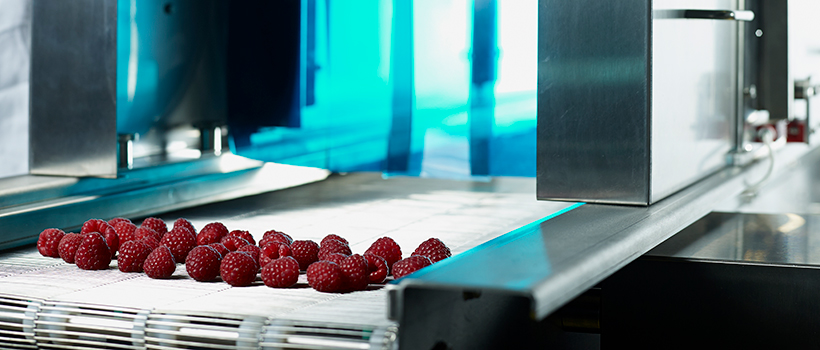
Process validations for non-thermal and new technologies – have you validated the worst case?
23 May 2023 | Robbie McGill, Process Technologist - Process Innovation and Andrew Bosman, Process Engineer - Technology and Trends Scouting
To protect from unsafe product and financial loss, and to ensure due diligence, process validation is the collection and evaluation of data to establish that a process is capable of consistently delivering a safe product.
High Pressure Processing (HPP) and Ultraviolet Light (UV-C) are now widely used in the food and drink industry, typically to inactivate microorganisms in products and on surfaces respectively. Just as with thermal processing, where a microbial inactivation process is a critical control point in a food safety plan, a worst-case validation must be conducted.
Unlike thermal processing, new food processing technologies will not have a long history of validation data and experience to back up general assumptions. In the absence of such data it is therefore important to validate products on a case-by-case basis and this may even mean that the effectiveness of a particular process has to be re-evaluated for individual products.
It is therefore important to question – “have you truly validated the worst case?”.
Worst-case process validation
Process validation is a well-known concept for the thermal treatment of food and beverages with well-defined process parameters, such as target organism, product processing temperature, ‘hold time’ duration and come-up time. With validations always considering the worst case for these factors. This same validation principle is also applied to New Technologies, although the measured parameters may be different depending on the technologies.
There are the obvious factors that must be taken into account during the validation of new technologies, such as the hold pressure when using a high pressure processing (HPP) system, or the delivered dosage of ultraviolet (UV) light in a UV-C system. Unlike thermal processing however, there are lesser known factors that should be addressed to determine whether they influence the microbial inactivation effectiveness (or ‘killing power’) of the process.
We have recently completed an internal funded study into these lesser known, or “forgotten” factors, to determine if they do indeed influence the killing power, and whether these are significant enough to warrant consideration when validating.
The study aimed to answer the following questions:
- Does a change in food composition significantly affect the microbiological kill of a HPP system?
- Do the surface properties of packaging alter the micro reduction achievable in a UV-C process?
From our study we found that there are factors – outside those that are commonly stated in the majority of validations – that can have a significant and substantial effect on the log reduction achieved by these new technologies.
Some of the results are summarised below. Members can see the full details, findings and conclusions via the R&D report and linked Research Summary Sheet.
What we have found
For HPP, oil content was found to have a significant and substantial effect on the killing power of the HPP system for a variety of the most common food pathogens. The range of oil content tested varied the reduction achieved by more than 1 log (reduction in the level of microorganisms, in colony forming units per gram).
We have concluded that food properties can influence the log reduction for some microorganisms in some foodstuffs and that these properties should therefore be considered when validating new technologies. Improper consideration can lead to processes that are not correctly validated when the food matrix of a product changes. Product recipes can make a substantial and significant difference in the validation of a process. With the help of Campden BRI, we can ensure the safety of an HPP validated product by determining the envelope of relevant conditions that the product might exist in.
Validate support and much more
We can help carry out process validation studies for your products using our wide range of in-house emerging technologies in combination with our biosafety level II microbiology lab. Using our expertise, knowledge and experience, we also provide consulting and bespoke training on a wide range of technologies.
We help clients ensure that their process delivers the required levels of microbiological inactivation for the manufacture of food-safe products for HPP, UV-C, cold plasma, pulsed electric field and other technologies – both thermal and non-thermal, as well as both existing and new / emerging.
We can assess the feasibility of new technologies with a variety of products. Our wide range of equipment also allows benchmarking of processes against some established methods so that clients can fully see all the benefits of a new process.
Our bespoke training would also be beneficial to those looking at understanding a particular system or understand the process and ‘how to’ of conducting a robust validation.
How can we help?
Contact us to discuss how we can help you with technical solutions for new technologies
New technologies services
For more on our services offered in this area, visit the page by clicking the button below.








